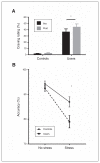Impaired cognitive performance under psychosocial stress in cannabis-dependent men is associated with attenuated precuneus activity
- PMID: 31509368
- PMCID: PMC7828906
- DOI: 10.1503/jpn.190039
Impaired cognitive performance under psychosocial stress in cannabis-dependent men is associated with attenuated precuneus activity
Abstract
Background: Deficient regulation of stress plays an important role in the escalation of substance use, addiction and relapse. Accumulating evidence suggests dysregulations in cognitive and reward-related processes and the underlying neural circuitry in cannabis dependence. However, despite the important regulatory role of the endocannabinoid system in the stress response, associations between chronic cannabis use and altered stress processing at the neural level have not been systematically examined.
Methods: Against this background, the present functional MRI study examined psychosocial stress processing in cannabis-dependent men (n = 28) and matched controls (n = 23) using an established stress-induction paradigm (Montreal Imaging Stress Task) that combines computerized (adaptive) mental arithmetic challenges with social evaluative threat.
Results: During psychosocial stress exposure, but not the no-stress condition, cannabis users demonstrated impaired performance relative to controls. In contrast, levels of experienced stress and cardiovascular stress responsivity did not differ from controls. Functional MRI data revealed that stress-induced performance deteriorations in cannabis users was accompanied by decreased precuneus activity and increased connectivity of this region with the superior frontal gyrus.
Limitations: Only male cannabis-dependent users were examined; the generalizability in female users remains to be determined.
Conclusion: Together, the present findings provide first evidence for exaggerated stress-induced cognitive performance deteriorations in cannabis users. The neural data suggest that deficient stress-related recruitment of the precuneus may be associated with the deterioration of performance at the behavioural level.
© 2020 Joule Inc. or its licensors
Conflict of interest statement
None declared.
Figures



References
-
- UNODC. World drug report 2018. New York: United Nations Publications; 2018.
-
- Curran HV, Freeman TP, Mokrysz C, et al. Keep off the grass? Cannabis, cognition and addiction. Nat Rev Neurosci. 2016;17:293–306. - PubMed
-
- Volkow ND, Swanson JM, Evins AE, et al. Effects of cannabis use on human behavior, including cognition, motivation, and psychosis: a review. JAMA Psychiatry. 2016;73:292–7. - PubMed
Publication types
MeSH terms
LinkOut - more resources
Full Text Sources
Medical
